25 have author last names that start with H have author last names that start with H
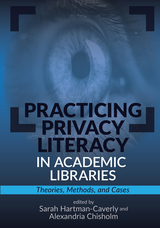
Practicing Privacy Literacy in Academic Libraries: Theories, Methods, and Cases can help you teach privacy literacy, evolve the privacy practices at your institution, and re-center the individuals behind the data and the ethics behind library work. Divided into four sections:
- What is Privacy Literacy?
- Protecting Privacy
- Educating about Privacy
- Advocating for Privacy


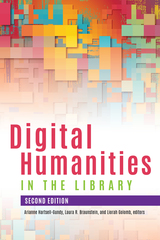
This revised and expanded edition of 2015’s Digital Humanities in the Library includes key reprints from the first edition and new chapters that explore digital humanities and diversity, inclusion, and equity; issues of labor, precarity, and infrastructure; scholarly communication and taxonomies of credit; long-term sustainability; and library digital humanities in the age of institutional austerity.
Divided into sections on theory and practice, chapter authors work in a variety of institution types in many different roles and offer ideas and strategies for cross-institutional collaborations and new approaches to the digital humanities work being done. As Paige Morgan says in the foreword, “Any digital humanist who can enthuse about data can also tell you that computers alone cannot do the work—you need the thoughtfulness of a human expert to find the way forward. This collection can help us do that.”
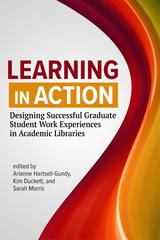
How do you supervise a graduate student working in a library—and not just adequately, but well? What is a valuable and meaningful work experience? How can libraries design more equitable and ethical positions for students?
Learning in Action: Designing Successful Graduate Student Work Experiences in Academic Libraries provides practical, how-to guidance on creating and managing impactful programs as well as meaningful personal experiences for students and library staff in academic libraries. Fourteen chapters are divided into four thorough sections:
- Creating Access Pathways
- Developing, Running, and Evolving Programs for LIS Students
- Working with Graduate Students without an LIS Background: Mutual Opportunities for Growth
- Centering the Person
Learning in Action brings together a range of topics and perspectives from authors of diverse backgrounds and institutions to offer practical inspiration and a framework for creating meaningful graduate student work experiences at your institutions.

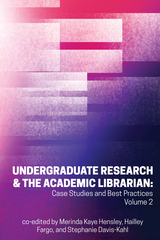
—From the Foreword by Janice DeCosmo
Undergraduate research is a specific pedagogical practice with an impact on teaching and learning, and the definition of what counts as research continues to expand to include different types of projects, mentors, and institutions. Diversity, equity, and inclusion in librarians’ work with students and faculty are present and growing. Collaborations between faculty, librarians, and students are furthering student knowledge in new ways. This community and an awareness of students’ non-academic challenges demonstrate the library’s contribution to students’ overall sense of belonging within their institutions.
This second volume of Undergraduate Research & the Academic Librarian—following 2017’s first volume—contains 22 new chapters that explore these expanded definitions of research and the changes wrought in the profession and the world in the intervening years. Five sections examine:
- First-Year Undergraduate Research Models
- Cohort-Based Models
- Tutorials, Learning Objects, Services, and Institutional Repositories
- Course-Based Undergraduate Research Collaborations
- Building and Sustaining Programs



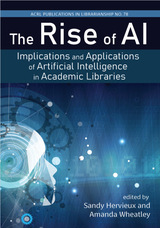
The Rise of AI collects projects, collaborations, and future uses from academic librarians who have begun to embrace AI in their work. In three parts—User Services, Collections and Discovery, and Toward Future Applications—it explores:
- machine translation
- creating incubation spaces
- robotics
- combining information literacy initiatives with AI literacy
- fostering partnerships with other on-campus groups
- integrating AI technology into collections to enhance discoverability
- using AI to refine metadata for images, articles, and theses
- machine learning
The Rise of AI introduces implications and applications of artificial intelligence in academic libraries and hopes to provoke conversations and inspire new ways of engaging with the technology. As the discussion surrounding ethics, bias, and privacy in AI continues to grow, librarians will be called to make informed decisions and position themselves as leaders in this discourse.
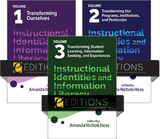
Grappling with this potentially unexpected identity comes amid a time of significant transition for higher education itself. Academic librarians must figure out how to counter mis-, dis-, and malinformation, address shrinking funding for collections while costs increase, and establish meaningful partnerships in diverse, data-driven environments. And writ large, librarianship as a profession continues to grapple with its responsibility to challenge information illiteracy across contexts, its support of systemic systems of oppression under the guise of neutrality, and its value to a society flooded with information.
In three volumes, Instructional Identities and Information Literacy uses transformative learning theory—a way of understanding adult learning and ourselves—to explore the ways librarians can meaningfully advance how we think about our identities, instructional work, and learning as transformation. Three volumes explore:
- Transforming Ourselves
- Transforming Our Programs, Institutions, and Profession
- Transforming Student Learning, Information Seeking, and Experiences
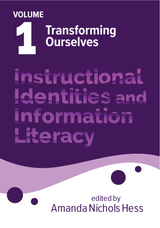
Grappling with this potentially unexpected identity comes amid a time of significant transition for higher education itself. Academic librarians must figure out how to counter mis-, dis-, and malinformation, address shrinking funding for collections while costs increase, and establish meaningful partnerships in diverse, data-driven environments. And writ large, librarianship as a profession continues to grapple with its responsibility to challenge information illiteracy across contexts, its support of systemic systems of oppression under the guise of neutrality, and its value to a society flooded with information.
In three volumes, Instructional Identities and Information Literacy uses transformative learning theory—a way of understanding adult learning and ourselves—to explore the ways librarians can meaningfully advance how we think about our identities, instructional work, and learning as transformation. Three volumes explore:
- Transforming Ourselves
- Transforming Our Programs, Institutions, and Profession
- Transforming Student Learning, Information Seeking, and Experiences
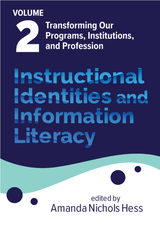
Grappling with this potentially unexpected identity comes amid a time of significant transition for higher education itself. Academic librarians must figure out how to counter mis-, dis-, and malinformation, address shrinking funding for collections while costs increase, and establish meaningful partnerships in diverse, data-driven environments. And writ large, librarianship as a profession continues to grapple with its responsibility to challenge information illiteracy across contexts, its support of systemic systems of oppression under the guise of neutrality, and its value to a society flooded with information.
In three volumes, Instructional Identities and Information Literacy uses transformative learning theory—a way of understanding adult learning and ourselves—to explore the ways librarians can meaningfully advance how we think about our identities, instructional work, and learning as transformation. Three volumes explore:
- Transforming Ourselves
- Transforming Our Programs, Institutions, and Profession
- Transforming Student Learning, Information Seeking, and Experiences
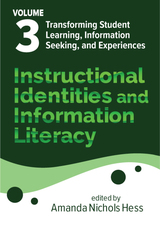
Grappling with this potentially unexpected identity comes amid a time of significant transition for higher education itself. Academic librarians must figure out how to counter mis-, dis-, and malinformation, address shrinking funding for collections while costs increase, and establish meaningful partnerships in diverse, data-driven environments. And writ large, librarianship as a profession continues to grapple with its responsibility to challenge information illiteracy across contexts, its support of systemic systems of oppression under the guise of neutrality, and its value to a society flooded with information.
In three volumes, Instructional Identities and Information Literacy uses transformative learning theory—a way of understanding adult learning and ourselves—to explore the ways librarians can meaningfully advance how we think about our identities, instructional work, and learning as transformation. Three volumes explore:
- Transforming Ourselves
- Transforming Our Programs, Institutions, and Profession
- Transforming Student Learning, Information Seeking, and Experiences







This primary reference tool for the library and information science (LIS) community supports those who either desire or are required to publish in the professional literature. LIS students at the masters and doctoral levels can also benefit from this comprehensive volume.

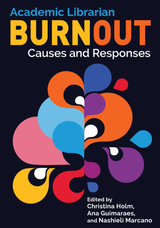
Academic Librarian Burnout can help librarians develop the agency to challenge the assumptions and practices that have led to so much professional burnout. In five thorough parts, it offers ways to discuss burnout in our work environments, studies burnout’s nature and causes, and provides preventative intervention and mitigation strategies:
- Reframing Burnout
- Conditions that Promote Burnout
- Lived Experiences
- Individual Responses to Burnout
- Organizational Responses to Burnout
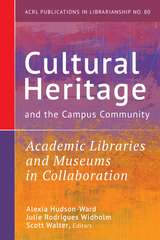
Cultural Heritage and the Campus Community collects examples of successful academic library-museum collaborations and serves as critical knowledge for the cultural heritage sector. Authors from libraries and museums across the United States demonstrate how to develop and execute partnerships and bring forth new dimensions of transdisciplinary objects-based pedagogy, research, and learning centered on inclusive educational practices. Chapters explore visual thinking strategies and the Framework for Information Literacy in Higher Education in the undergraduate classroom; restoring Indigenous heritage through tribal partnerships; using object-based teaching to motivate student research; and much more.
The collaborative approaches highlighted here demonstrate the power of possibility when two collections-centric entities unite to enrich our collective understanding of materiality, instructional approaches, and the importance of provenance. Cultural Heritage and the Campus Community also illustrates why interrogating past practices and value assignments within academic library and museum collections is essential to advancing culturally relevant approaches to knowledge sharing in physical and digital spaces.
READERS
Browse our collection.
PUBLISHERS
See BiblioVault's publisher services.
STUDENT SERVICES
Files for college accessibility offices.
UChicago Accessibility Resources
home | accessibility | search | about | contact us
BiblioVault ® 2001 - 2024
The University of Chicago Press









